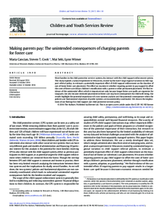Abstract
Most families in the child protective services system also interact with the child support enforcement system. This study exploits a natural experiment in Wisconsin, created by the state's large regional variation in child support referral policy, to estimate a potentially important effect of child support enforcement on the duration of out-of-home foster care placement. The effect we examine is whether requiring parents to pay support to offset the costs of foster care delays children's reunification with a parent or other permanent placement. We find evidence of this unintended effect, which is important not only because longer foster care spells are expensive for taxpayers, but also because extended placements in foster care may have consequences for child well-being. Our results highlight the potential importance of cross-systems analysis and the potential consequences when the policies and fundamental objectives of public systems are inconsistently coordinated. We discuss the implications of our findings for child support and child protective services policy.

